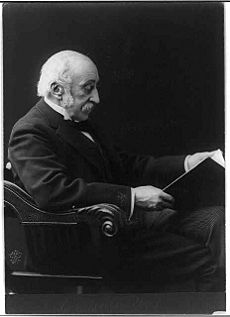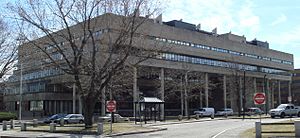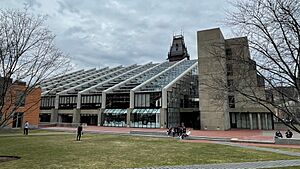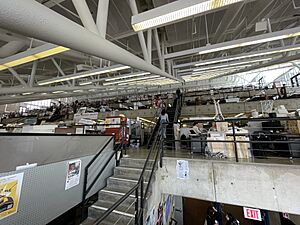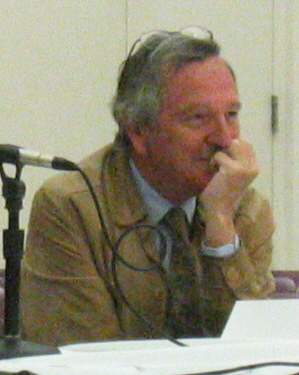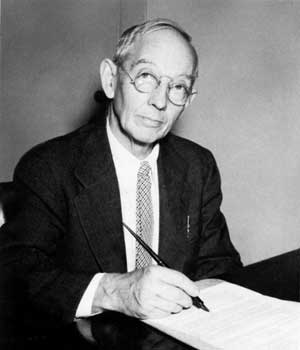Harvard Graduate School of Design facts for kids
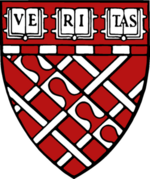
Coat of arms
|
|
| Type | Private graduate school of design |
|---|---|
| Established |
|
|
Parent institution
|
Harvard University |
| Dean | Sarah Whiting |
|
Academic staff
|
206 |
| Students |
|
| Location |
,
U.S.
42°22′33″N 71°06′50″W / 42.3758°N 71.1139°W |
| Campus | Urban |
The Harvard Graduate School of Design (often called GSD) is a special school at Harvard University. It is a private university in Cambridge, Massachusetts. The GSD teaches students about design.
Students at the GSD can earn advanced degrees in many exciting areas. These include architecture (designing buildings), landscape architecture (designing outdoor spaces), and urban planning (designing cities). They also learn about urban design, real estate, design engineering, and design studies.
The GSD has over 13,000 former students, called alumni. Many of them have become famous architects, urban planners, and landscape architects. The school is known worldwide as a top place to study design.
The GSD has the oldest landscape architecture program in the world, started in 1893. It also has North America's oldest urban planning program, which began in 1900. Architecture was first taught at Harvard in 1874. The Graduate School of Design was officially created in 1936. It brought together landscape architecture, urban planning, and architecture into one graduate school.
Contents
History of the GSD
The Harvard Graduate School of Design has a long and interesting history. It started with different design subjects being taught separately. Later, they all came together to form the school we know today.
Architecture at Harvard
The first classes in architecture at Harvard University began in 1874. These courses were introduced by Charles Eliot Norton. This marked the beginning of formal architecture education at the university.
Landscape Architecture Programs
In 1893, Harvard University offered the first professional course in landscape architecture in the United States. Then, in 1900, the world's first full program for landscape architecture was created. This program was started by Frederick Law Olmsted Jr. and Arthur A. Shurcliff. The School of Landscape Architecture was officially established in 1913.
Urban Planning and Design
The first urban planning courses were taught at Harvard University in 1900. By 1909, urban planning classes were added to Harvard's design studies. These were part of the School of Landscape Architecture. In 1923, students could specialize in urban planning. This was part of the Master in Landscape Architecture degree.
In 1929, North America's first graduate degree in urban planning was created at Harvard. The planning program moved to the Graduate School of Design in 1936. Later, in 1984, the Department of Urban Planning and Design was formed. This department also included the Urban Design Program. The urban planning program fully returned to the GSD in 1994. In 2021, the department also took on the Master in Real Estate (MRE) degree.
How the GSD Was Established
The three main design fields – landscape architecture, urban planning, and architecture – officially joined together in 1936. This is when the Harvard Graduate School of Design was formed. Joseph F. Hudnut was an architect and professor who became the first dean. In 1937, Walter Gropius joined the GSD. He was a famous modern designer and helped change the school's teaching style. He brought other modern designers like Marcel Breuer to help.
In 1960, Josep Lluís Sert started the first Urban Design program in the country. The GSD's main building today, George Gund Hall, opened in 1972. It was designed by Australian architect John Andrews, who was a GSD graduate. The school also helped develop geographic information systems (GIS) in the 1960s and 1970s. GIS is a technology used to map and analyze geographic data. More recently, the school has explored new ways to use robots in architectural design.
Leaders of the GSD (Deans)
| Dean | Years Served | What They Did |
|---|---|---|
| Joseph Hudnut | 1936–1953 | Architect |
| Josep Lluís Sert | 1953–1969 | Architect and urban planner |
| Maurice D. Kilbridge | 1969–1980 | Urban planner |
| Gerald M. McCue | 1980–1992 | Architect |
| Peter G. Rowe | 1992–2004 | Architect |
| Alan A. Altshuler | 2005–2008 | Urban planner |
| Mohsen Mostafavi | 2008–2019 | Architect |
| Sarah M. Whiting | 2019–present | Architect |
What Students Learn (Academics)
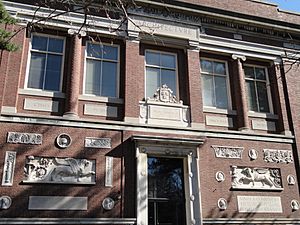
The GSD offers many different master's degrees. These include:
- Master in Landscape Architecture (MLA)
- Master of Architecture (MArch)
- Master of Architecture in Urban Design (MAUD)
- Master of Landscape Architecture in Urban Design (MLAUD)
- Master in Urban Planning (MUP)
- Master in Real Estate (MRE)
- Master in Design Engineering (MDE)
- Master in Design Studies (MDes)
The school also offers a Doctor of Design (DDes) degree. It works with the Graduate School of Arts and Sciences to offer a Doctor of Philosophy (PhD) degree. This PhD is for architecture, landscape architecture, and urban planning.
School Rankings
As of 2016, the GSD's programs were ranked first overall by DesignIntelligence. This ranking looks at programs that are approved by the National Architectural Accrediting Board.
Learning for Professionals
The GSD also has "Executive Education" programs. These are classes for adults who are already working in design fields. They help professionals learn new skills and advance their careers. For example, there is a year-long program for real estate professionals.
Student Life at GSD
In the 2012–2013 school year, there were 878 students at the GSD. About 42% of students studied architecture. Another 21% studied landscape architecture, and 18% were in urban planning. The rest were in doctoral or design studies programs. Around 65% of the students were from the United States. The average age of a GSD student is 27. Students at the GSD are part of the Harvard Graduate Council (HGC). This is a student government group for all Harvard graduate students. There are also many student clubs just for GSD students.
Research and Publications
Besides teaching, the GSD also supports research. It has the Loeb Fellowship, which helps people explore design ideas. The school also publishes the Harvard Design Magazine twice a year. They also publish other books about design and student projects. Since 1935, the GSD has given out the Wheelwright Prize. This is an international award for architects to travel and study.
Design Research Labs
The GSD has special Design Labs. Here, students and teachers combine ideas and hands-on work to do research. Their goal is to use design to make positive changes in society. There are seven labs, including:
- Material Processes and Systems Group
- Energy, Environments and Design
- New Geographies Lab
- Responsive Environments and Artifacts Lab
- Social Agency Lab
- Urban Theory Lab
- Geometry Lab
Campus Buildings
The GSD campus is located near Harvard Yard. It is across the street from Memorial Hall. Gund Hall is the main building for the GSD. It holds most of the student spaces and teacher offices. Other buildings nearby have space for research labs, more offices, and student research areas.
Gund Hall: The Main Building
Gund Hall is the heart of the GSD. It has studio spaces and offices for about 800 students and over 100 teachers and staff. There are also classrooms, workshops, and computer areas. The building has a cafeteria called Chauhaus, a project room, and Piper Auditorium. The Frances Loeb Library is also inside.
The main studio area is called the "Trays." It has five levels under a large, slanted glass roof. This roof lets in lots of natural light. Gund Hall also has an outdoor yard with a basketball court. This yard is often used for events, showing student projects, and graduation ceremonies. The building was designed by architect John Andrews and engineer William LeMessurier. Both were GSD graduates.
Frances Loeb Library
The Frances Loeb Library is the main library for the Graduate School of Design. It has a huge collection of over 300,000 books and journals. It also has special departments for materials and visual resources. The Special Collections Department holds rare books and old documents from the GSD.
Fabrication Lab
The Fabrication Lab is a place where students and teachers can build models and prototypes. It has both traditional tools and modern technology. You can find a full wood shop, a metals shop, and printing labs here. It also has 3D printers, CNC tools, robotic machines, and laser cutter machines.
Famous People from the GSD
As of 2013, the GSD had over 13,000 former students in 96 countries. The school had 77 full-time teachers and 129 visiting teachers. About 45% of the teachers were born outside the United States.
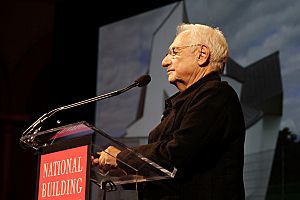
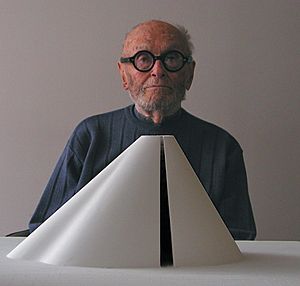
Notable Alumni (Former Students)
Many GSD alumni have become very famous in the world of design. Some of them include:
- John Andrews, who designed the GSD's Gund Hall.
- Frank Gehry, a Pritzker Prize Laureate (a top award in architecture). He studied urban planning.
- Philip Johnson, another Pritzker Prize Laureate and famous architect.
- IM Pei, also a Pritzker Prize Laureate, known for designing many famous buildings.
- Jeanne Gang, a well-known architect.
- Frederick Law Olmsted Jr., who helped create the landscape architecture program.
- Jack Dangermond, who helped develop GIS technology.
- Shaun Donovan, who was a US Secretary of Housing and Urban Development.
- Cornelia Oberlander, a famous landscape architect.
- Dan Kiley, a modernist landscape architect.
- Thomas Dolliver Church, a landscape architect.
- William LeMessurier, a structural engineer who worked on Gund Hall.
- Kongjian Yu, a landscape architect and educator.
Current Faculty (Teachers)
Some of the notable teachers currently at the GSD include:
- Jeanne Gang
- Rem Koolhaas
- Rafael Moneo
- Sarah M. Whiting (the current Dean)
- Toshiko Mori
- Hanif Kara
Former Faculty (Past Teachers)
Many important designers and thinkers have taught at the GSD in the past. These include:
- Walter Gropius, who founded the famous Bauhaus school.
- Marcel Breuer, a well-known architect and furniture designer.
- Josep Lluis Sert, a former dean who helped bring modern architecture to the United States.
- Zaha Hadid, a Pritzker Prize Laureate known for her unique designs.
- Bjarke Ingels, a visiting professor and famous architect.
- Moshe Safdie, known for designing Habitat 67.
See also
 In Spanish: Escuela de Graduados de Diseño de Harvard para niños
In Spanish: Escuela de Graduados de Diseño de Harvard para niños


